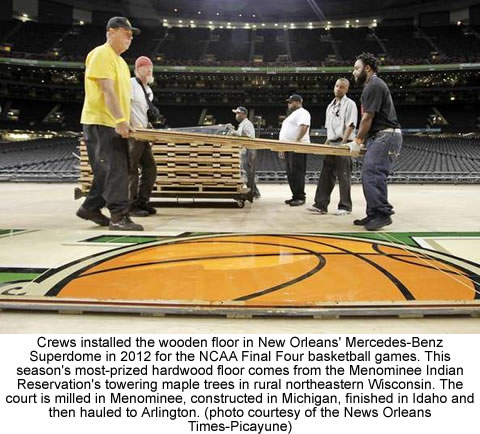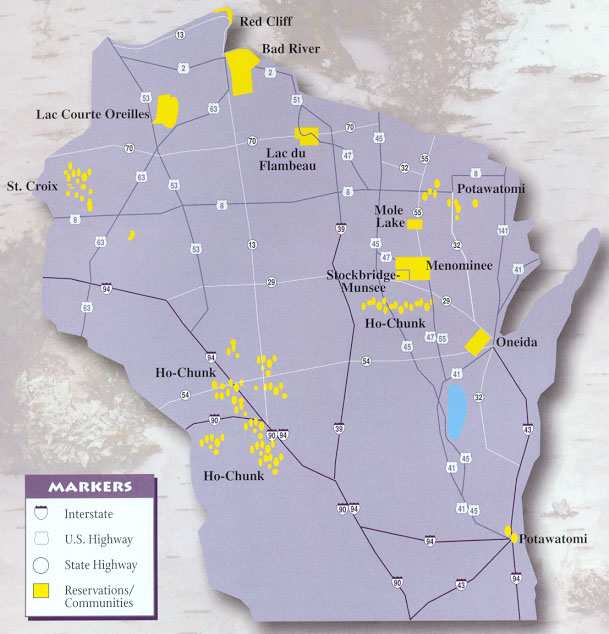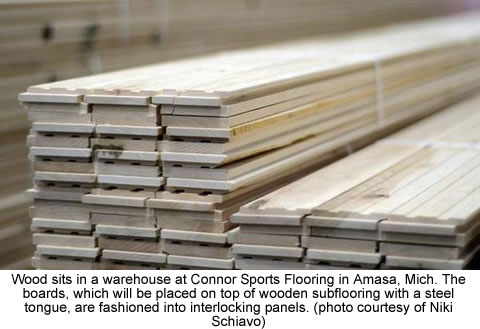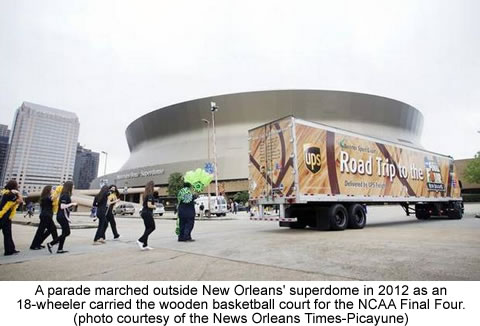 |
Canku Ota
|
 |
|
(Many Paths)
|
||
|
An Online Newsletter
Celebrating Native America
|
||
|
April 2014 - Volume
12 Number 4
|
||
|
|
||
|
Floor Will Make Journey
From Wisconsin Forest To Final Four In Arlington
|
||
|
by Ben Kamisar - Staff
Writer Dallas News
|
||
 The
road to the Final Four — or at least the floor — starts
in Menominee, in rural northeastern Wisconsin. The
road to the Final Four — or at least the floor — starts
in Menominee, in rural northeastern Wisconsin.
The tiny town doesn't have a competitive college basketball program. But the work there makes all the difference on which team can call itself the nation's best. Welcome to the 235,000-acre Menominee Indian Reservation, source of the towering maple trees culled for this season's most-prized hardwood floor. And it's headed soon to AT&T Stadium for the NCAA men's basketball championship. "People watch the game and that's our timber out there," said Jim Kaquatosh, sales manager for Menominee Tribal Enterprises. "People on the reservation are real proud they could be a part of it." The portable court, which will be emblazoned with a logo depicting the stadium's dome, takes a long journey before its Texas debut. It's milled in Menominee, constructed in Michigan's Upper Peninsula, finished in Idaho and then hauled to Arlington. It all begins in snowy Wisconsin.
Despite more than a century of logging, the reservation has more trees than when the mill began. That's all thanks to sustainable yield foresting practices, a part of Menominee lore. Tribal Chief Oshkosh told the Menominee in the 1800s that if they "take only the mature trees, the sick trees, and the trees that have fallen … the trees will last forever." Heeding that advice, Menominee Tribal Enterprises carefully selects which trees to cut to ensure a steady supply of wood. Connor Sport Court International, based in Salt Lake City, has been the exclusive provider for the Final Four since 2006. It's Connor that trusts the Menominee with the wood that eventually carries the company's name. "They are one of the premier foresters in the country," said Lauren Gillian, marketing director at Connor Sports. The NCAA has a multiyear agreement with Connor Sports to manufacture and install the floor. After the mill saws the trees, the planks are brought to the Connor plant in Amasa — population 280 — in Michigan's Upper Peninsula. Its 125 workers come from all over Iron County. The boards, placed on top of wooden subflooring with a steel tongue, are fashioned into interlocking panels. Like a puzzle, they are numbered so they can be installed in the same order. Connor's Amasa plant manufactures about 700 courts each year for schools, gyms, colleges and the NBA. North Texas' Final Four floor already has been built, its panels stacked in the plant and awaiting a trip to one of Connor Sports' finishing partners — this year, United Services Inc. in Idaho Falls, Idaho.
Among the big jobs: affixing to center court the Final Four logo — a mainstay for the high-profile TV event. It's a silver, black and blue design — as befits the home of the Dallas Cowboys — marked by a sleek image of the domed stadium. It came about after more than two months of talks among Connor, the NCAA and the Cowboys. "Each Final Four has its own identifier," Gillian said. "We wanted to make sure that we incorporated the colors and the feel of the city of Dallas." Once the final touches are done, the floor will be taken apart and loaded onto trucks for the trek to Arlington, where it will be re-assembled by Connors Sports. Before then, its gets a floor show tour, stopping at Klyde Warren Park in Dallas, an athletic complex in Carrollton, TCU and the Fort Worth Stockyards.
The Final Four floor tour will showcase the parcels in a transport truck, include a replica piece for pictures, and set up basketball hoops to shoot for prizes. March 26: Noon to 2 p.m., Klyde Warren Park, Dallas. March 26: 3-5 p.m., Integrated Athletic Development, Carrollton. March 27: 11 a.m.-1 p.m., Stockyards Station, Fort Worth. March 27: 2:30-5 p.m. at TCU, near Frog Fountain, Fort Worth. March 28: Final delivery at AT&T Stadium, Arlington. Closed to the public.
BY THE NUMBERS Grade 1 maple 30 250 50,000 pounds Four hours
SOURCE: Menominee Tribal Enterprises, Connor Sports |
 |
|
|
||
|
|
||
| Canku Ota is a free Newsletter celebrating Native America, its traditions and accomplishments . We do not provide subscriber or visitor names to anyone. Some articles presented in Canku Ota may contain copyright material. We have received appropriate permissions for republishing any articles. Material appearing here is distributed without profit or monetary gain to those who have expressed an interest. This is in accordance with Title 17 U.S.C. Section 107. | ||
|
Canku Ota is a copyright ©
2000 - 2014 of Vicki Williams Barry and Paul Barry.
|
||
 |
 |
|
|
The "Canku
Ota - A Newsletter Celebrating Native America" web site and
its design is the
|
||
|
Copyright ©
1999 - 2014 of Paul C. Barry.
|
||
|
All Rights Reserved.
|
||
 Mostly
during the frigid winter months, the tribe's lumber company cuts
enough top quality maple for the floor. Trees have whiter wood during
the winter, when the sap is less visible.
Mostly
during the frigid winter months, the tribe's lumber company cuts
enough top quality maple for the floor. Trees have whiter wood during
the winter, when the sap is less visible. Crews
there will sand, seal, paint and finish the court.
Crews
there will sand, seal, paint and finish the court.